Obituary: Edward Daly, former Catholic bishop of Derry
- Published
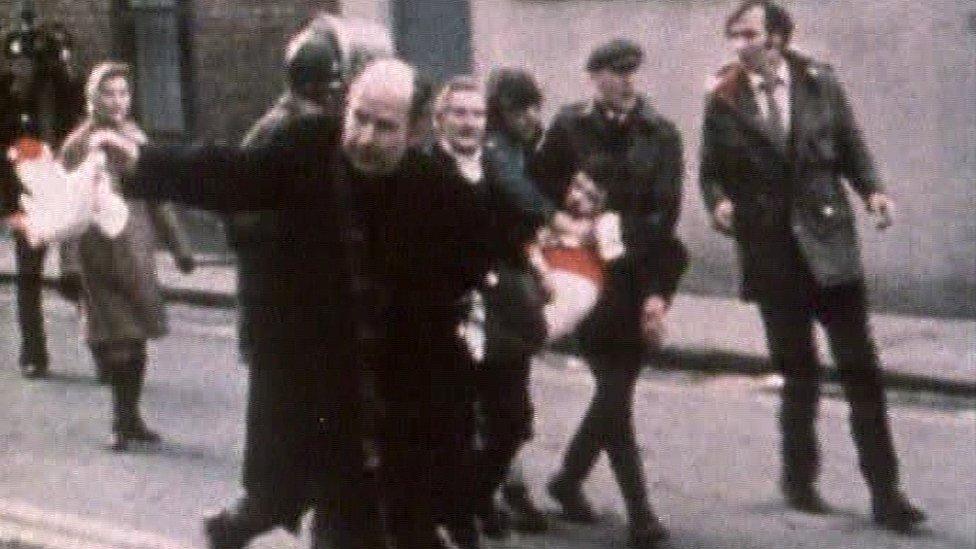
Fr Edward Daly leading a group of people carrying the dying body of Jack Duddy, shot by soldiers in Derry on Bloody Sunday, 30 January 1972
The photograph of Fr Edward Daly waving a white handkerchief as the dying Jackie Duddy is carried away is, for many, the iconic image of Bloody Sunday.
A curate at St Eugene's Cathedral in Londonderry's Bogside, he attended the civil rights march in his capacity as parish priest, but instead became irrevocably linked to what was one of the darkest days of the Troubles.
He went on to become bishop of Derry and during nearly 20 years in the post, worked tirelessly to promote peace.
Bishop Daly gave evidence to both the Widgery and Saville inquiries into the events of 30 January 1972 and when the Saville Report was published in June 2010 he spoke of his "enormous relief" that the "burden has been lifted off my shoulders".
"I said on Bloody Sunday that those people were murdered, and a lot of people didn't believe that at the time, but I think all will believe it now," he said.
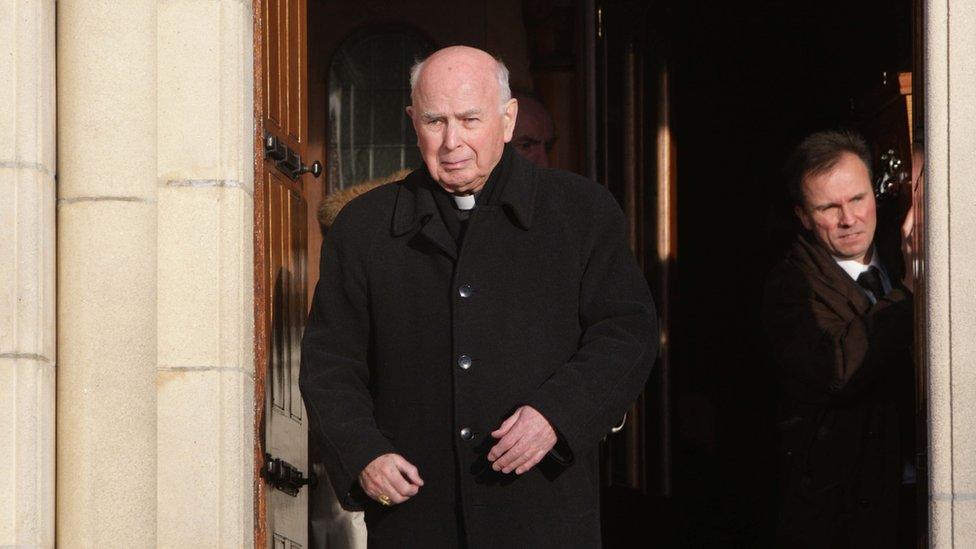
Bishop Daly will be remembered as "the priest with the white handkerchief"
Edward Daly was born in Ballyshannon in County Donegal on 5 December 1933, and grew up in the border village of Belleek, in County Fermanagh.
He came to Derry as a teenage boarder at St Columb's College, then went to Rome to study for the priesthood at the Irish College.
His first parish was in Castlederg in County Tyrone, and he moved to St Eugene's Cathedral in 1962.
Bishop Daly's chief responsibility was always to his parishioners, but as a priest in the Bogside in the 1960s, it was inevitable that he would have first-hand experience of many of the tragedies of the Troubles.
His priority was always the victims, and he made clear that he was "a religious and moral leader, not a political one".
'Nervous, frightened'
It was in that capacity that he attended the civil rights march in Derry in January 1972.
Thirteen civilians were shot dead by members of the British Parachute Regiment on what would become known as Bloody Sunday. Another victim died later from his injuries.
Fr Daly was standing near 17-year-old Jackie Duddy when he was shot.
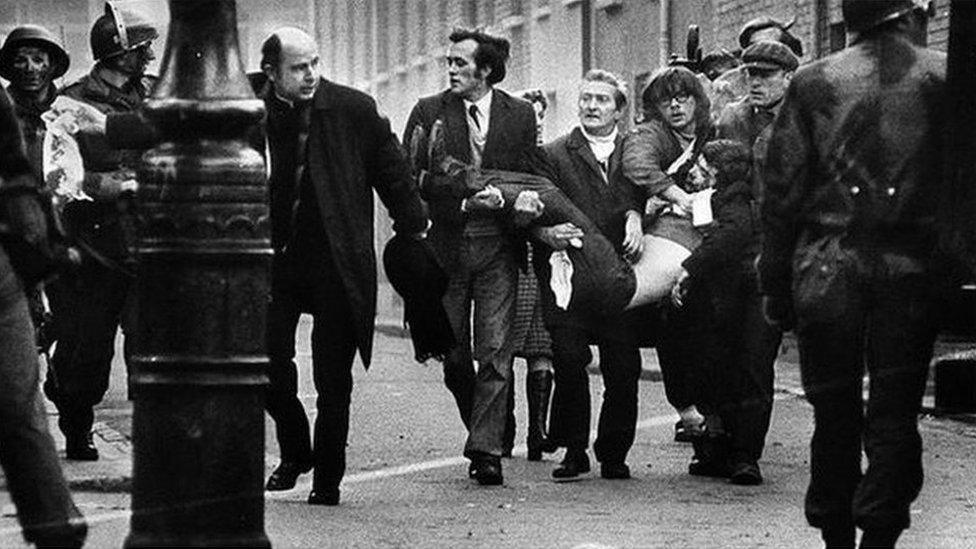
Thirteen people were killed on Bloody Sunday in January 1972 and another died of his injuries some months later
"I went in front with this handkerchief in my hand and they carried Jackie behind me.
"We were very nervous and frightened and when we laid him down on the pavement he had died," he said.
The television footage made Fr Daly recognisable around the world, but he was uncomfortable with his fame.
"It changed my life completely. I lost my anonymity," he said. "I think all the other things I did were forgotten.
"I was involved a lot in the ministry of people in that area, and theatre work, and everything else took second place.
"I was the priest with the handkerchief and that was it," he said.
Later the Duddy family gave him a photograph of Jackie, which he always kept on his desk.
In an BBC interview that day, he was adamant that the marchers had been unarmed.
"There was nothing fired at them, I can say that with absolute certainty because I was there."
He repeated this to the Widgery Tribunal, and, controversially, said he had seen a civilian gunman on Bloody Sunday.
"That didn't exactly make you the most popular person in town. People would have preferred to forget about that," Fr Daly said.
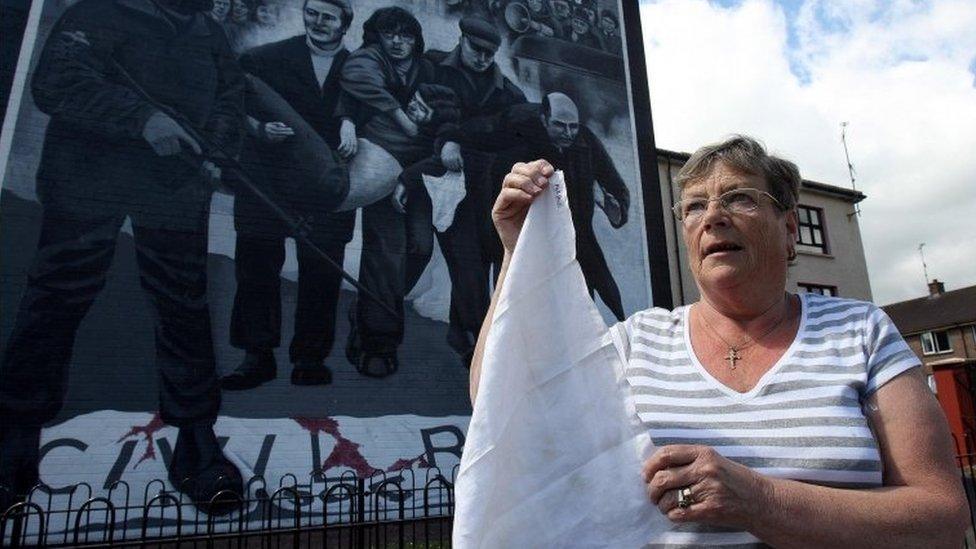
Kay Duddy carries in her handbag the white handkerchief Fr Daly used on her dying brother's wounds
In 1973, he left Derry to work as a religious advisor to RTE in Dublin, and the year after returned to Derry as bishop.
At just over 40, he was the youngest bishop in Ireland, but said he was "quite certain" he would not have received the appointment without Bloody Sunday.
As the city's bishop for almost 20 years, he worked to bring the different churches, and their parishioners, together.
He was unafraid to speak out against violence, and introduced a ban on paramilitary trappings at funerals.
In November 1976, Fr Daly helped organise a protest in response to a spate of sectarian murders.
"Virtually every clergyman in Derry city, and led by the two bishops, walked in silent procession across the city from Altnagelvin Hospital to the City Cemetery.
"It was the first time that the clergy of the city had made such a statement, such a witness, together," he said.
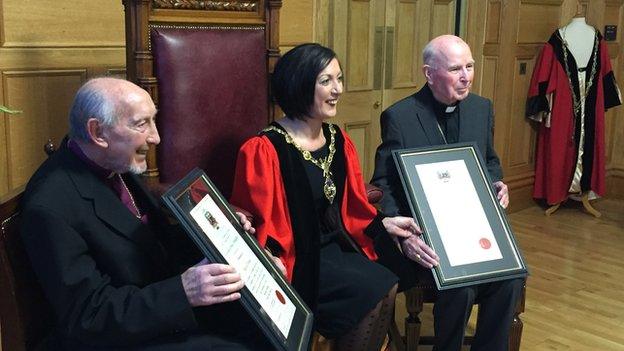
Bishop Mehaffey and Bishop Daly received the freedom of the city in 2015
In 1980, James Mehaffey became the Church of Ireland bishop of Derry and Raphoe, and the two formed a close friendship.
They were both founders of the Waterside Churches Trust, as well as founder trustees of the Inner City Trust, designed to inject commercial and social life into the city centre after a decade of bombing.
A stroke forced him to retire as bishop in 1993, and he began ministering at the Foyle Hospice.
He celebrated Mass every Sunday, as well as looking after the spiritual needs of the terminally ill and their family and friends, and described his work there as "an immense privilege".
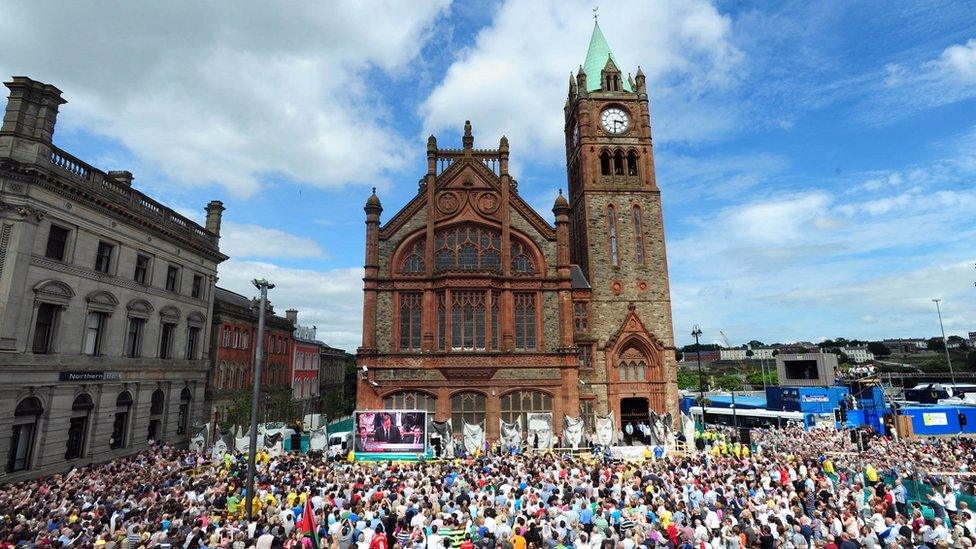
Thousands of people gathered in Derry in 2010 to watch Prime Minister David Cameron apologise for the Army's actions on Bloody Sunday
Bishop Daly was in the Guildhall on 15 June 2010 to hear what he knew to be the truth - that the marchers had been unarmed - acknowledged to the world.
"It was a very emotional afternoon, and I felt a sense of uncommon relief that this burden has been lifted off my shoulders, and the shoulders of the people in this city," he said.
"It's wonderful when the truth emerges, when people whose characters have been sullied are vindicated.
"It was good to have lived to witness this unforgettable day."
'Grave injustice'
The same year, he criticised the Police Ombudsman's report into the 1972 Claudy bombings, saying he had difficulty accepting his conclusions that a priest was involved in an atrocity which killed nine people.
Bishop Daly said he had interviewed Fr James Chesney in the 1970s, and had been told he was only a "verbal republican".
"There was no intimation he was actively involved," he said.
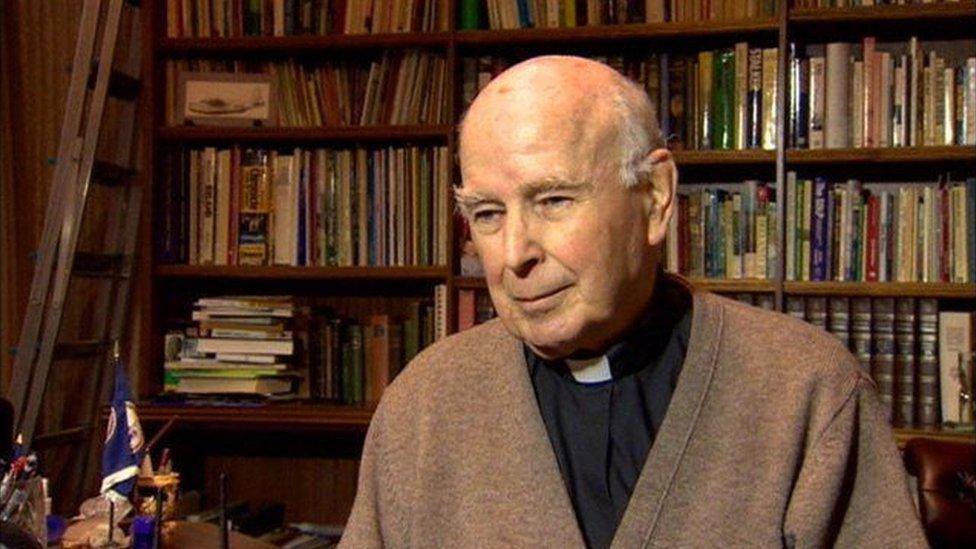
Dr Daly retired as chaplain to Derry's Foyle Hospice last year
But he also spoke of his sympathy with the victims of Claudy, and said he believed it was a grave injustice to them that Fr Chesney had not been arrested.
In 2011, he called for a change to the law on clerical celibacy, saying there needed to be a place in the modern Catholic church for a married priesthood.
Around the world, Bishop Daly will be remembered as "the priest with the white handkerchief" who became one of the symbols of Bloody Sunday.
In Derry, his legacy will be as a man of peace who was the constant champion of the people he served.
- Published8 August 2016
